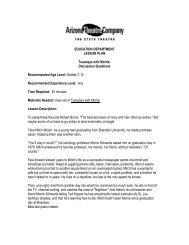Play Guide [356k PDF] - Arizona Theatre Company
Play Guide [356k PDF] - Arizona Theatre Company
Play Guide [356k PDF] - Arizona Theatre Company
- No tags were found...
Create successful ePaper yourself
Turn your PDF publications into a flip-book with our unique Google optimized e-Paper software.
The Great GatsbyDIRECTINGJB: The Jazz Age is a fascinating historical period, full of all kindsof societal shifts in relationship to women, society and war. Howdo you see these issues being raised in the play?SW: They are an inherent undercurrent in the play but they arealso made manifest in Nick’s observations. What I find fascinatingin Gatsby is that he’s the societal opposite of a character we knowwell – Willy Loman [from Arthur Miller’s Death of A Salesman].This idea of the American Dream which centers around monetaryachievement is explored and debunked by Nick Carraway. What’sexciting to me about these characters is that we see an echelonof power players in society, in Europe and in America (andparticularly in New York), in a sense, these are the 1%, exploringa new form of nihilism in response to the First World War. Theidea of people asking “What’s good for me?” overtaking “What’sgood for us?” And because death has become an inherent partof life in a way that no generation before or after has ever seenThe script of The Great Gatsbyby Simon Levy on designer YoonBae’s workspace.(because of the number of people who died in the First World War), the idea of what itmeans to be alive is explored in this story. So the theatricality of the Jazz Age as well as thecreation of jazz as a musical style which is happening in the basements, the speakeasiesand the illegal liquor parlors of New York, physicalize the metaphor of above and belowthe surface which is very helpful.JB: It does occur to me listening to you that The Great Gatsby isn’t like Shakespeare,where you can move the action of the play to another era and it still works. You can’treally move the story of The Great Gatsby to any other time or place.SW: Why would you bother? What would you be trying to say? As a director, I believeyou can say more about where we are now as a society by leaving The Great Gatsby inperiod. You’re still commenting on this economic downturn that we’ve just experiencedand the parallels of our lives now to the First World War. But this world of economicexcess juxtaposed against those with less. That’s what’s interesting - that Carraway is not awealthy man, but he has access to the excessive wealth in a way that is tempting but alsodisgusting. It’s similar to the way Faust learns too late from Mephistopheles that the grassis not greener. It’s interesting that you don’t really see moments of happiness with Gatsby,a man who has achieved more than Croesus. People think that if they won the lottery,they’d be happy, that their problems are solved, but that’s basically what Gatsby’s doneand he’s not. There’s an inherently moral message in this which I find very compelling anduniversal. This is not an American story, it’s a universal narrative. From the book we getthe feeling of a country at a crossroads, and a sense of a culture finding its feet. And thetwenties were an extraordinary period. The moral frameworks that had been set up in theprevious hundred years were being tested. It’s during this era that we get the Rockefellersand the oil barons and America becomes the powerhouse and the center of invention.It’s the great moment in American history in all the possibilities and all these moments ofpotential. And this play captures all these ideas.<strong>Arizona</strong> <strong>Theatre</strong> <strong>Company</strong> <strong>Play</strong> <strong>Guide</strong> 40


![Play Guide [356k PDF] - Arizona Theatre Company](https://img.yumpu.com/46218320/40/500x640/play-guide-356k-pdf-arizona-theatre-company.jpg)
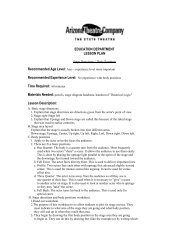
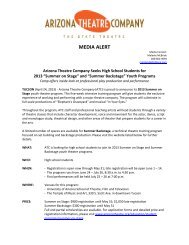
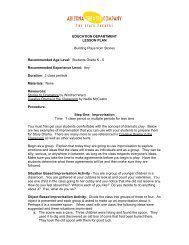
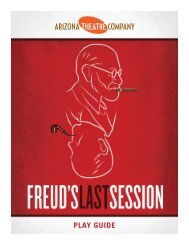
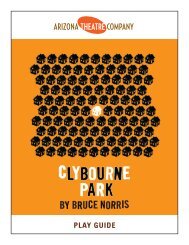
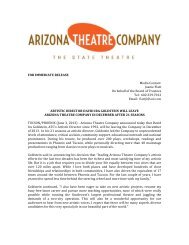
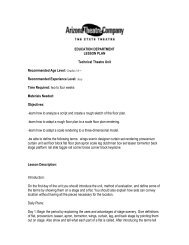
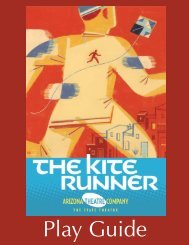
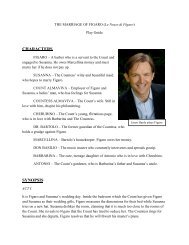
![[title of show] Arizona Theatre Company Play Guide 1](https://img.yumpu.com/24482689/1/190x245/title-of-show-arizona-theatre-company-play-guide-1.jpg?quality=85)
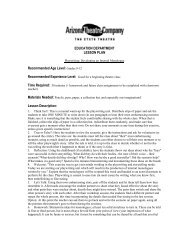
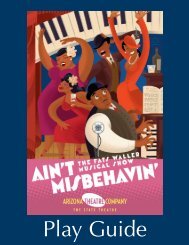
![Play Guide [1.2MB PDF] - Arizona Theatre Company](https://img.yumpu.com/11952176/1/190x245/play-guide-12mb-pdf-arizona-theatre-company.jpg?quality=85)
